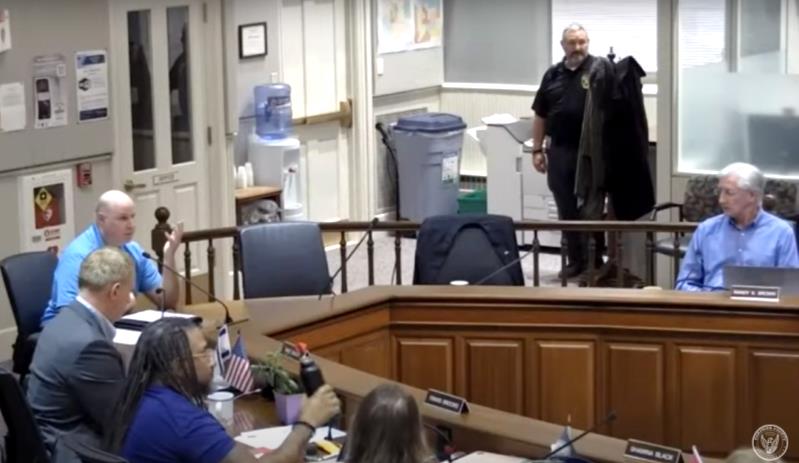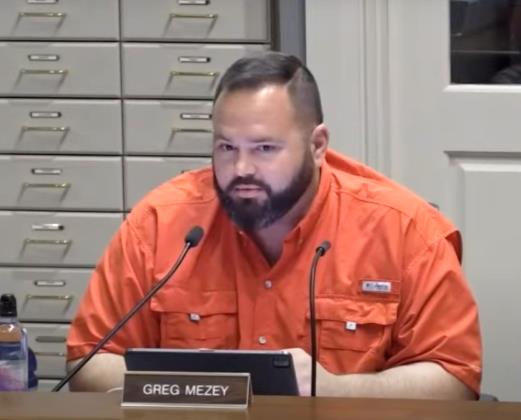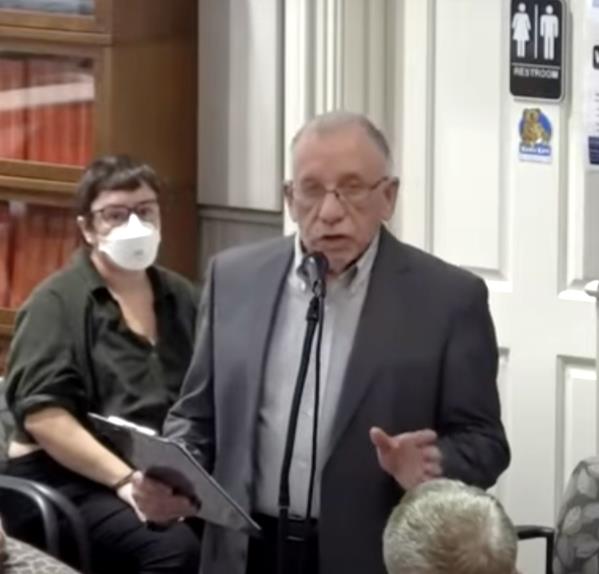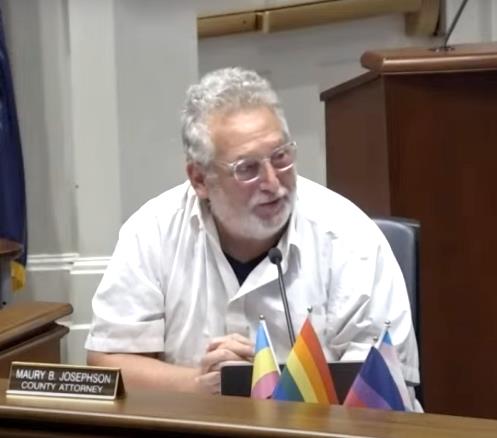County Legislature funds meeting mags; building guards

Reporting and commentary by Robert Lynch; October 13, 2025
For years and years, ever since the Tompkins County Legislature left the state-secured County Courthouse and settled into a place of its own two buildings away, any of us could visit a legislative meeting unimpeded, just because we wanted to. We’d walk through a door off DeWitt Park, climb a right-angled flight of stairs or take the elevator, then open another door leading into our lawmakers’ spacious, cathedral-ceilinged showplace. We’d find ourselves a seat in the carpeted visitor’s gallery. Let the public business begin.
Those days of privacy-respecting, suspicion-free access are over for now, and probably forever.
By the narrowest of margins that left not a single vote to spare, the Tompkins County Legislature October 7 ratified an Administration-endorsed security plan along with the the funding to impose it. Soon a magnetometer will appear just inside that DeWitt Park door. Uniformed personnel are already wanding down pant legs and searching bags and belongings.
Welcome to the world of the frightened legislator.
“This space is public; you’re welcome to come in. But I also think we have an obligation to our staff to feel safe,” legislator Greg Mezey counseled others on the night the new security protocols won their approval. “And if you read an email about getting your head blown off just because you’re a County employee, or being used as a sacrifice in town square, being burned alive, you might think differently about how you feel about safety.”
“I hope that our other members in municipal government never have to experience those concerns,” Mezey assured, “but they’re real.”

Quite transparently, the Tompkins County Legislature’s ruling majority is running scared. Yet those among us who cherish First Amendment freedoms are frightened as well, but for a different reason.
“I’ve got a question. Is anybody really feeling unsafe here tonight?” this Enfield Councilperson, Robert Lynch, asked the Legislature during his municipal privilege-of-the-floor opportunity at the start of the October 7 meeting. “I know I don’t. But you know what? I feel a chill in the room.” That chill was generated by my first-ever security screening at the base of those right-angled stairs.
“I don’t like living in a world of fear,” I stated in my municipal leadership report to the Legislature. “I guess we can live in a world of fear or we can live in a world of love, and acceptance and trust. And when it comes to the public who come here to petition their government, I think we should be trusting of them and say they are here under good intentions.”
Of course, this Enfield Councilperson’s deference to trust and good intentions did not prevail that night. By its eight-to-five vote, the County Legislature embraced an Administration plan to spend more than $138,000 this year and an estimated $628,000 in 2026 for equipment and personnel to implement its “Public Safety Enhancements.”
As stated in its authorization, County Government will spend $7,500 to buy a magnetometer and wands, and the rest of the money on salary and fringe benefits to employ one manager and six security officers. Tompkins County’s Department of Emergency Response, not the Sheriff, will oversee enforcement.

In addition to legislative chambers, tighter security measures will soon come to the Tompkins County Whole Health Department on Brown Road and also toughened security at the Mental Health Department downtown, a place where some security protocols already exist.
Tompkins County, beginning in 2022, increased security and stationed guards at the Human Services Building on Ithaca’s State Street. It did so fearing that visitors might carry-in weapons. Officials also concluded that crime around the building had increased.
As funded by the Legislature, guards will check bags screen attendees not only outside all County Legislature meetings, but also at all legislative committee sessions. Unlike at the Main Courthouse, where State Courts’ personnel handle the security, guards at the Legislature’s building will not be deployed throughout the workday or surveil the government workforce.
For the record, those supporting the new security enhancements October 7 were Legislature Chair Dan Klein, Enfield-Ulysses rep. Anne Koreman, and her Democratic colleagues Amanda Champion, Shawna Black, Greg Mezey, Veronica Pillar, and Travis Brooks. Groton’s Lee Shurtleff cast the only Republican vote in the resolution’s support.
Opposing the security resolution were Newfield-Enfield’s Randy Brown, his Lansing Republican colleague Mike Sigler, and Democrats Mike Lane, Rich John, and Deborah Dawson. (Democrat Dan Nolan was excused that night; the Legislature needs eight votes to pass anything.)
Mike Lane’s opposition was expected. Although he spoke not at all about the security measures at the October meeting, Lane did object last December when the Legislature approved more limited safety protocols at the Gov. Daniel D. Tompkins Building, the 1854 landmark where legislators meet. The only security add-on last year was a buzz-in electronic lock at the DeWitt Park door, one that legislative clerks upstairs can unlock for allowed visitors and disable during and a half-hour before public meetings.
“I don’t think it sends a very good message to the public,” Lane said last December of what was planned at the time. “I just think we don’t need to be afraid of the public. That’s the message that it sends,” Lane told fellow legislators. “I think what we have now is the way we should keep it.”
Of course, what the Tompkins County will have soon, if it doesn’t have it already, will reach far deeper into personal privacy than do the precautions implemented last December about which Lane had complained.
The gallery was packed for the meeting October 7. In an irony of ironies, of the 21 people who spoke or had statements read during an hour-long privilege-of-the-floor marathon, as many as eleven of them addressed the “Flock” cameras stationed about Tompkins County, cameras that read motorists’ license plates. Yet among the many who faulted Flock’s invasion of privacy and who worried about its data’s misuse, not one person cited the more immediate intrusions to which they’d just been subjected courtesy of the jovial guards at the downstairs door.
The Flock controversy consumed the bulk of the County Legislature’s unusually long, more than five-hour meeting that night. By contrast, lawmakers dispatched the in-house security matter in just 17 minutes’ time. Only a few of those we’ve elected even spoke to it.
“People need to feel comfortable coming into work, and they need to feel safe,” Shawna Back, a key security-hardening proponent, told the meeting. “We know that the staff in this building have not always felt safe,” Black asserted. “I’ve heard that personally, and we know that people that come here to talk in public also need to feel that,” Black added, referring to safety.
Black related an occasion years ago when one or more persons had entered chambers carrying “big bags that looked like they’re carrying guns.” Black and former legislator Martha Robertson began texting each other across the big, oval, legislative desk. They speculated about contents. Black now concedes the bags contained nothing more than photographic gear.
“There was absolutely nothing we could do,” Black recounted of the events at that time. She and Robertson were emotional. But now, Black said by contrast, the downstairs entrance is guarded. “What we have is working right now,” Black assessed the new security plan. “We know that our staff is fairly comfortable right now, as comfortable as they can with the threats that we’re hearing.”

And indeed it appears to be those latest threats, either phoned or online, still unsubstantiated, that have most rattled local lawmakers.
In a news release issued October 6, one day before the Legislature convened, Tompkins County Sheriff Derek Osborne announced that his office had “received reports of threatening emails sent to several local schools within the county,” messages also, he said, containing “threats directed toward county employees, elected officials, and local financial institutions.”
Ten days before that announcement, on September 26, media reports indicated that as many as four local school districts, including Ithaca’s, had “received an email threat indicating the possibility of a school shooting at an unspecified school in the county.” The September 26 false-alarm threat later prompted the Ithaca City School District to move the location of its future Board of Education Meetings to a room more secure.
Both incidents remain under investigation. Police have announced no arrests.
Even though the heightened security measures at Tompkins’ legislative chambers were not officially authorized prior to the October 7 session, they found themselves in place before the opening gavel even fell that night. Asked at the meeting door, a security guard informed this writer that similar procedures had already been applied for two or three meetings previous, presumably those of legislative committees.
What’s more, Tompkins County maintains a security double-standard. While this municipal lawmaker was being searched and wanded October 7, a County legislator, well-known to those in Enfield, was allowed to walk around the reviewing table with neither a search nor a question.
“This is not meant to limit access. This is about creating safe access,” legislator Greg Mezey insisted, likely directing his reply most immediately to this Enfield lawmaker. Mezey noted that those who visit Capitol Hill are routinely screened for weapons. So are those who visit the New York State Capitol, as well as are visitors to Ithaca’s City Hall.
To some of us, the City Hall application of magnetometers describes a most laughable overreach. It began decades ago during the Iraq war, when a troubled man in the gallery threw his shoe, an Iraqi insult, at then-Ithaca Mayor Carolyn Peterson during a Common Council meeting. City Hall promptly installed metal detectors. Of course, the machines and searches could never have stopped the actions of Peterson’s critic unless everyone attended barefoot.

Ithaca legislator Rich John, a Cornell law professor, doubts that what the County Legislature has now imposed and funded will do much good. He thinks it’s not the solution.
“I’d like to say as many here have said, well, we need to show that we’re keeping people safe,” John told the meeting. “I don’t think we can do that. We can try. We can try different things. But I don’t think that (security) necessarily is a guarantee we can make.”
Rich John would prefer society and law enforcement focus less on hardening meeting places and more on “penetrating the anonymity of the Internet” to identify and arrest the threat-makers. “If somebody’s really serious about this, they just do it somewhere else,” John reasoned.
“For me it’s just a lot of cost,” Newfield-Enfield’s Randy Brown complained about the security package’s seven-person addition to payroll and its $628,000 expense next year.
“I understand people are nervous and scared, and unfortunately that’s life sometimes,” Brown shared, albeit bluntly. “Threats come from all angles, and sometimes we’re all politicians,” Brown said.
One of those “scared” legislators is Amanda Champion. The Ithaca Town representative asked County Attorney Maury Josephson whether the threat of workplace violence could carve out for her one of those rare “extenuating circumstances” under which state law permits legislators to attend remotely.

“If I feel unsafe and that’s affecting my mental health, can I attend these meetings via Zoom, as if I had COVID or a broken foot?” Champion asked.
The County Attorney paused for ten seconds, a pause that felt like an eternity. “I think it may very well,” Josephson cautiously answered.
The County Attorney, in answer to Shawna Black’s question, also said that a municipality’s workplace liability for acts of random violence is “very much an evolving area of tort law.” While court precedent has generally insulated governments from liability, Josephson then cautioned, “It’s only a matter of time before we start seeing cases where employers are sued and potentially held liable for failing to provide adequate security.”
Still, security’s benefit comes at liberty’s expense. And improved security finds itself selectively applied.
One can argue that the most needed place for weapons screening is at the door of every schoolhouse. But it’s not done there. Neither is it imposed at most hospital emergency room entrances, nor at Wegmans, nor Walmart, nor Texas Road House. It only happens with government; and in Tompkins County’s case, it only impacts those attending public meetings. It’s a time and a place when and where persons exercise a most protected constitutional right, the right to petition one’s government. It’s a protected right the height of which not even a school child enjoys.
“I’ll tell you this,” Enfield’s Councilperson informed the Tompkins County Legislature the night he was first screened and then allowed to speak his mind, “If ever we get in the Town of Enfield where somebody says we’re going to surveil the people who walk through our door to petition our government to talk about whatever issue… I think that would be the time I will step off the Town Board, because I will have been driving a wedge as a Town Board member between myself and my constituents…”
Tompkins County can do things its way, and it will. Enfield may do things differently. And to many of us, it should.

